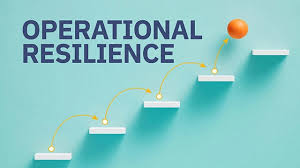Training Course on Operational Resilience in Educational Settings
Training Course on Operational Resilience in Educational Settings equips educators, administrators, and institutional leaders with critical tools, risk management strategies, and continuity planning techniques to respond to unexpected disruptions—including pandemics, cyber threats, natural disasters, and systemic changes—while maintaining quality education delivery.

Course Overview
Training Course on Operational Resilience in Educational Settings
Introduction
In an era defined by rapid change, crises, and digital transformation, educational institutions must build strong foundations of operational resilience to ensure continuity, adaptability, and long-term success. Training Course on Operational Resilience in Educational Settings equips educators, administrators, and institutional leaders with critical tools, risk management strategies, and continuity planning techniques to respond to unexpected disruptions—including pandemics, cyber threats, natural disasters, and systemic changes—while maintaining quality education delivery.
By leveraging evidence-based frameworks, proactive planning, and resilient infrastructure models, this course prepares educational organizations to identify vulnerabilities, streamline crisis communication, and maintain academic excellence in the face of adversity. Whether the challenge is technological failure, supply chain disruption, or social unrest, operational resilience empowers institutions to anticipate, absorb, adapt, and transform.
Course Objectives
- Understand the core principles of operational resilience in educational institutions.
- Identify and assess risk factors impacting academic continuity.
- Develop robust business continuity plans tailored for schools and universities.
- Enhance cybersecurity resilience across learning platforms.
- Implement emergency response frameworks for physical and digital crises.
- Foster a culture of adaptive leadership in education.
- Apply data-driven decision-making during emergencies.
- Design and simulate disaster recovery plans specific to academic operations.
- Create communication protocols for crisis response and stakeholder updates.
- Build cross-functional resilience teams within educational settings.
- Monitor and evaluate key resilience indicators using institutional data.
- Integrate inclusive resilience strategies for diverse student populations.
- Align resilience planning with local and international regulatory frameworks.
Target Audience
- School administrators
- University leadership teams
- Policy makers in education
- Disaster and emergency planners
- IT and cybersecurity professionals in academia
- Risk management officers
- Curriculum designers
- Education-focused NGOs and consultants
Course Duration: 5 days
Course Modules
Module 1: Foundations of Operational Resilience
- Definition and principles of resilience
- Resilience vs. recovery: what's the difference?
- Core capabilities of resilient educational systems
- Organizational culture and resilience mindset
- Strategic visioning for long-term sustainability
- Case Study: Resilience implementation at a U.S. urban public school district
Module 2: Risk Assessment in Educational Settings
- Identifying internal and external threats
- Tools for institutional risk analysis
- Vulnerability mapping and prioritization
- Regulatory compliance and risk mitigation
- Scenario planning for worst-case events
- Case Study: Flood risk assessment in rural schools in India
Module 3: Continuity Planning for Learning Delivery
- Business continuity strategies in education
- Contingency models for blended and remote learning
- Ensuring access to instructional materials
- Continuity planning for exams and assessments
- Technology and data continuity planning
- Case Study: Remote learning pivot during COVID-19 in Kenya
Module 4: Cybersecurity and Digital Infrastructure Resilience
- Cyber risks facing modern education
- Digital asset inventory and security protocols
- Student and faculty data protection
- Cloud-based education continuity systems
- Staff training on digital threats
- Case Study: Ransomware attack response at a community college
Module 5: Crisis Communication and Stakeholder Engagement
- Key components of an effective crisis comms plan
- Roles of leadership and spokespeople
- Multi-platform messaging tools (SMS, social media, LMS)
- Engaging parents, students, and communities
- Feedback loops and media relations
- Case Study: Communication strategies after a school shooting incident
Module 6: Leadership and Governance in Crisis Situations
- Adaptive leadership during emergencies
- Transparent governance and ethical decision-making
- Mobilizing teams and task forces
- Managing morale and mental health
- Leadership reflection and evaluation
- Case Study: Leadership response to wildfires in Australia affecting schools
Module 7: Inclusive and Equitable Resilience Planning
- Equity-based access to educational support
- Planning for learners with disabilities
- Socioeconomic disparities and crisis impact
- Language, culture, and trauma-informed strategies
- Resource allocation fairness
- Case Study: Inclusive learning support in war-affected refugee camps
Module 8: Evaluation, Metrics, and Resilience Audits
- Defining KPIs for resilience
- Monitoring tools and data dashboards
- Post-crisis audit frameworks
- Lessons learned and improvement loops
- Integrating findings into future planning
- Case Study: Post-earthquake resilience audit in Turkish high schools
Training Methodology
- Interactive workshops and scenario simulations
- Expert-led webinars and virtual panels
- Hands-on planning templates and tools
- Collaborative group work for strategy development
- Live Q&A sessions and peer feedback
- Access to digital resource library for continued learning
Register as a group from 3 participants for a Discount
Send us an email: info@datastatresearch.org or call +254724527104
Certification
Upon successful completion of this training, participants will be issued with a globally- recognized certificate.
Tailor-Made Course
We also offer tailor-made courses based on your needs.
Key Notes
a. The participant must be conversant with English.
b. Upon completion of training the participant will be issued with an Authorized Training Certificate
c. Course duration is flexible and the contents can be modified to fit any number of days.
d. The course fee includes facilitation training materials, 2 coffee breaks, buffet lunch and A Certificate upon successful completion of Training.
e. One-year post-training support Consultation and Coaching provided after the course.
f. Payment should be done at least a week before commence of the training, to DATASTAT CONSULTANCY LD account, as indicated in the invoice so as to enable us prepare better for you.